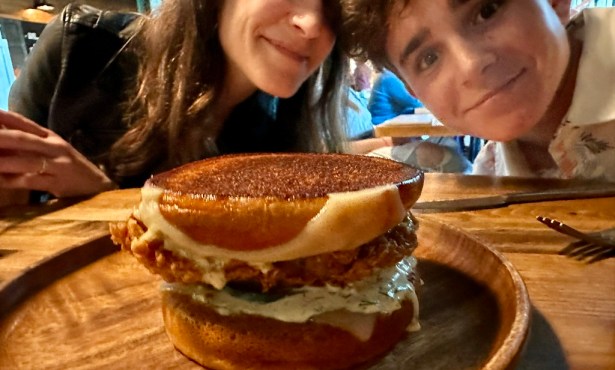Sex Talk
Where's the Stork When You Need Him?
We modern parents are so enlightened. Unlike our Dark Age ancestors, who whacked through the child-rearing jungles with dull old saws like “curiosity killed the cat” and “children should be seen and not heard,” we encourage kids’ inquisitiveness.
We quench their thirst for knowledge by reading them books about disgusting insects and having long talks about thunder: “I have no idea where it comes from. Good question, sweetie! Let’s look it up!” My son’s favorite PBS cartoon always seems to be explaining why mold grows on sandwiches.

Because our generation applauds children’s curiosity. We reward it. We even brag about it. Until the day it turns toward our underpants, and then we freak the flip out about it.
That happened to a friend of mine last week. Another parent in her son’s preschool brought a newborn baby into the classroom, and the tots began asking her questions. One piped up with the inevitable, “How did the baby get in you?”
While curiosity may not kill a cat, it can do serious damage to a postpartum female. Caught off guard and loathe to decide for other families when—and, dear god, how—this delicate topic should be broached, the new mom explained that she and her husband had engaged in strategic “hugging.”
“Oh!” interjected my friend’s son, delighted to contribute to the conversation. “My parents hug a lot.”
After she stopped laughing, my friend started worrying. Did she need to correct this misunderstanding, lest her son think he’s getting a baby sister every time his parents go in for a hi-honey-I’m-home embrace? And if so (gulp), how in the uterus does one explain nooky to a four-year-old?
Don’t get me wrong. We 21st-century parents are willing to have “the sex talk”; we just thought it would come … later. And with luck, even later than that. On the one hand, why should someone who can’t even distinguish between left and right need to know the complex, life-giving mechanics of human genitalia? And on the other … why does the prospect so unnerve us?
“Personally,” said my big-on-hugging friend, “I’m just afraid of freaking him out.” It’s a legitimate concern. When it comes to birds-and-bees discourse, experts tell us to answer only the specific question our child is asking, and no more. But vague explanations can backfire.
When another friend’s six-year-old daughter asked her to define sex, she said, “You know how you like it when I rub your back, and kiss you, and hug you? It’s like that—but without your clothes on.” Two weeks later, her husband went to read their daughter a bedtime story and came running downstairs hollering, “She just asked me to have sex with her, with my clothes on!”
Realizing she’d left out too much information, the mother sat her daughter down and—take two—offered up the clinical truth.
“That’s disgusting,” the girl concluded. “You’re lying.”
To be honest, some of us fret less about squashing our kids’ sexual psyches and more about fueling their playground talk. I’ve been the parent of the little angel who gives anatomically correct biology lessons in the sand box, and let me tell you: No amount of enlightenment can make that phone call feel good.
Mercifully, there’s a spate of books that promise to help parents strike just the right tone when talking about sex with their kids. I like the titles It’s Perfectly Normal, What’s Going on Down There?, and my personal favorite, Some Parts Are Not for Sharing.
But the best reproductive repartee I’ve ever heard took place between a woman I know and her five-year-old:
Daughter: Mommy, when I was in your tummy, how did I get there?
Mom: Daddy helped put you there.
Daughter: Did he help get me out?
Mom: Yeah … not so much.



